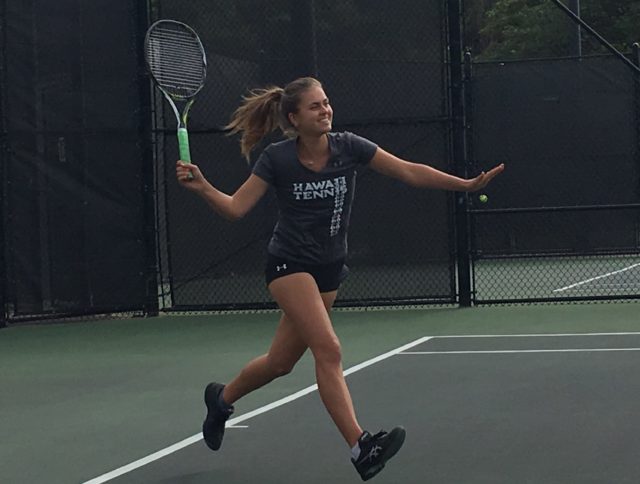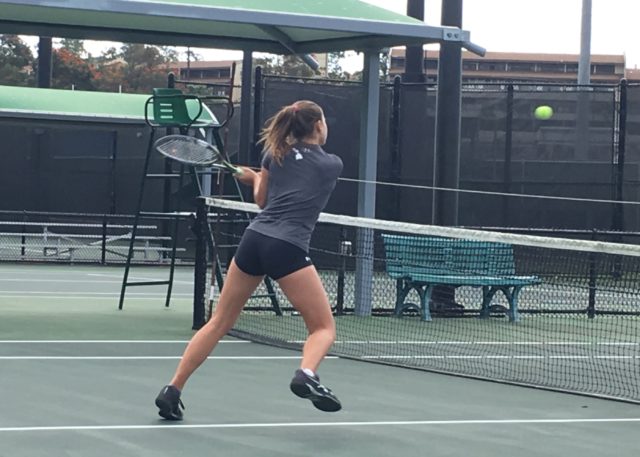Rainbow Wahine tennis: Melounova makes it work

The challenges have been large and small, personal and public, academic and athletic.
But Petra Melounova is a problem solver. Always has been.
The Hawaii women’s tennis star from the Czech Republic is having another stellar season in 2019. It’s difficult to top Big West player of the year status in your first two seasons of college, but what Melounova is doing this year might be her most impressive solution yet.
A persistent shoulder injury on the junior’s right (dominant) side has meant she’s had to adjust her play so as to avoid swinging overhead on her serves and opponents’ lobs — two huge aspects of the game.
Yet there Melounova is, piling up wins dual match after dual match. After a 4-6, 6-0, 6-4 win over No. 34 Salma Ewing of USC on March 3, Melounova picked up a rank of 119. For reference, she finished last season at No. 75 in the ITA poll when she made it to the NCAA singles tournament.
She has six straight singles victories (6-3 overall) heading into Thursday’s home dual match with Indiana at 3 p.m. at the UH Tennis Complex.
“Petra playing No. 1 (court) and having the consistency of winning against top-ranked schools, that says a lot about her mental toughness, because she’s battling some injuries, and (has) the desire to win and compete well,” coach Jun Hernandez said. “She’s taking pride in who she represents, more than herself. It’s the team, the university, and the state, so I’m really proud of what she’s accomplished.”
All that while carrying a 4.0 grade-point average and a cheery disposition as an electrical engineering major. Melounova was recently named the UH women’s sports representative to the Big West scholar-athlete list, along with Stijn van Tilburg for UH men’s sports, to go with her sixth career Big West player of the week honor.
“It gets harder and harder every semester,” said Melounova, who as a child desired to be an astronaut, and is still contemplating that future. “I can feel it, how hard it’s getting. But, it wasn’t as bad at the beginning, because you have to take a lot of science classes and I covered a lot of it in high school. But now, the engineering classes and all the labs, and especially (with) our travel schedule, it’s hard to make up everything.”
She manages, just as she’s found a way to adapt to her lack of overhead power by going to some slice action on underhanded drop serves, forcing opponents to play balls low and slow.
Against some players, it keeps her in the game; even highly ranked players just don’t see such a technique and have been left scratching their heads. In San Diego in October, Melounova got all the way to the ITA Southwest Regional quarterfinals in an 128-player draw before running into trouble.
“It really depends how strong are my opponents mentally,” she said. “Some girls can get distracted and miss a lot. On the other hand, I remember a match in the regionals, this UCLA girl (Abi Altick), she was just adjusting so well to it, and basically hitting winners almost every (time on) my serve. … It was hard for me, I barely won any. So it really depends on the opponent.”
Against USC’s Ewing, for example, the slice serve was no problem for the Trojan in the first set, Melounova noticed. But as the pressure ramped up in the second and third sets, the unconventional tactic became increasingly problematic for her.
Melounova is hopeful to get her full range of motion back by the Big West tournament (April 25-28), but she’s mindful that it could take a while, and that her team usually needs her to come through with a dual match point. (In the last two dual matches, USC and Cal State Fullerton, Melounova was the only UH player to prevail.)
Hernandez marvels at her ability to keep throwing opponents off balance with a well-rounded game. He’s noted her footwork has improved as a result of her serving disadvantage and subsequent defensive play.

If an opponent lobs it at her, she can retreat and hit a standard forehand. That’s not the same as an overhead smash, but it has to be respected.
“It’s kind of like a chess game in a way, so they keep going back and forth how they’re going to manage her,” Hernandez said. “But she’s also a very smart player, so she knows how to use her game. And she has a lot of different tools that she can use. Drop shots, lobs, she can drive the ball, she can commit, finish the point at the net. So she keeps them really off balance. They don’t know what’s coming. One, they come in, they (get) either a passing shot or a dip or a lob. So, she can do a lot of different things and she’s executing it well. Really she’s focusing on the things she can do rather than the things she doesn’t have. And that’s what makes her a great player.”
But the toughest thing to overcome took place in August on the other side of the globe.
That’s when Melounova’s father, Jaroslav, succumbed to a lengthy battle with the degenerative condition known as ALS (Lou Gehrig’s Disease) back in the Czech Republic. Melounova journeyed home to spend time with family and grieve. Since then, her mother, Miroslava, has kept herself active with work and playing — what else? — tennis.
In that, daughter takes after mother.
“She’s the person who was standing behind me the whole time,” said Melounova, her smile returning on a relatively chilly morning at the UH courts. “Without her pushing me when I was (a) child, I wouldn’t be anywhere.”
Until she ran into Hernandez as he recruited the European youth tennis circuit, she wouldn’t have considered Hawaii a realistic option, either. But here she is, leading the way for a UH team that won the Big West regular season in 2017 and the Big West tournament in 2018.
The injury-wracked Rainbow Wahine have some work to do to remain at that level. They’ve lost four straight dual matches and after facing Indiana this week play their next three on the road, with Long Beach State next on March 21.
But Petra Melounova is optimistic she can help solve that, too, voicing confidence in teammates like Maayan Sela, Nikola Dolakova and Michelle Pits.
“I really think we will trust the process and the results will come,” she said.
COMMENTS